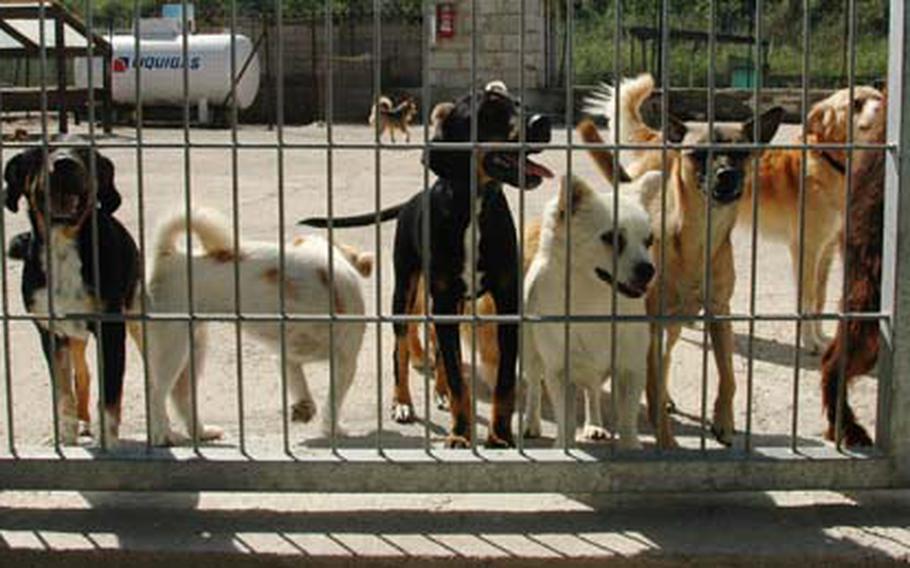
A group of stray or abandoned dogs available for adoption gather at a gate of the Lega Pro Animale veterinary clinic and shelter in Mondragone, Italy. (Sandra Jontz / Stars and Stripes)
A panel formed to review the military justice system will recommend that animal cruelty be added as a charge to the Uniform Code of Military Justice, according to a panel member.
The issue of servicemembers abusing, killing or abandoning their pets was one of the topics reviewed by the 2009 Commission on Military Justice, a nonprofit corporation formed in 1991 to improve public understanding of the military justice system. The commission held a public hearing in Washington last week.
The panel — comprising law professors, private practitioners and other legal experts — received numerous arguments from Americans and foreign nationals in Europe that specific language was needed to address crimes against animals, according to member Walter Cox, a former chief justice of the U.S. Court of Appeals for the Armed Forces.
"The commission agrees with the proposals completely and we’re going to forward a recommendation to the secretary of defense to take action on this," Cox said in a telephone interview Friday.
The commission’s 2009 meeting is the second time the panel has convened. The last time was in 2001.
During that meeting, the commission recommended a 12-member panel for capital cases — those that carry the death penalty — rather than a five-member panel, according to Jonathan Tracy, assistant director for the National Institute of Military Justice. That recommendation was included in the 2005 Manual for Courts-Martial.
There is currently no language in the UCMJ to address criminal actions against animals, other than military working dogs. Troops can, in theory, be charged under provisions such as Article 134 — "conduct of a nature to bring discredit upon the armed forces" — if their commanders wish.
Cox said the details are being worked out on what specific language the commission might recommend. And there’s nothing concrete yet on what punishments could be administered.
"It would model, in some fashion, some of the more progressive statues in the States," he said.
Animal cruelty is a felony in more than 30 states, with those convicted facing five-year maximum sentences in many states.
Supporters of a new UCMJ charge for animal cruelty said they were pleased with news of the recommendation.
Louise Harris, who is British and married to a retired airman once based at Aviano Air Base in Italy, said she was "extremely encouraged by it."
Harris, who for years has lobbied for such a charge, said the lack of language in the UCMJ has allowed Americans to get away with killing their pets in a handful of cases around Aviano.
Harris said she knew of veterinarians and animal rights activists in several countries who wrote to the commission supporting the new measures.
She said she believed the situation was the worst in Italy, because local justice systems in countries such as the United Kingdom and Germany are more responsive to animal cruelty cases. For example, an airman based at RAF Lakenheath in England was sentenced to prison by a British court for killing his dog in 2006.
The U.S. has veterinary clinics at each of its major installations in Italy. All are Army-run and the headquarters element is based in Vicenza. Jon Fleshman, public affairs officer for U.S. Army Garrison-Vicenza, said officials at Caserma Ederle are unaware of any cases of animal cruelty in the last few years and there aren’t any records to indicate such actions before that.
Christine Kohls, a German married to an American soldier stationed in Heidelberg, said there are German laws that apply, but jurisdiction on such cases can be tricky.
"It’s such a gray zone," said Kohls, who serves as a volunteer liaison at a local German animal shelter.
Though an owner often can be identified through microchips placed in the animal, Americans sometimes choose to leave their pets behind when they move, she said. Locals who do that are committing a crime and so are Americans, even if they currently avoid punishment.
The Commission on Military Justice will submit a report to Congress later this year. Congress must approve any changes to the UCMJ.